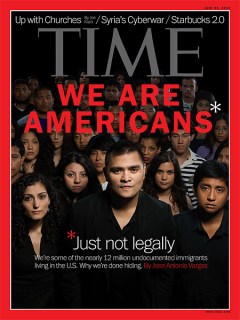Clockwise from top left: Julieta Garibay, from Mexico; Jong Min, from Korea; Yonerky Santana, from the Dominican Republic; Manuel Bartsch, from Germany; Yenny Quispe, from Peru; Erika Andiola, from Mexico; Conrado Santos, from Brazil; Camila Bortolleto, from Brazil
A year ago this month, I wrote an essay for the New York Times “coming out” about my status as an undocumented immigrant — what many people call an “illegal.” I told of my journey of being sent from the Philippines to the U.S. at age 12 without knowing I didn’t have the right papers; graduating from college and working as a successful journalist; and relying on a support network of American citizens (my high school principal and superintendent among them) to get me through. But mine is just one story. So with the help of friends and supporters, I founded a campaign called Define American, to document the lives of the undocumented and harness the support of our allies around this very controversial and misunderstood issue.
There are an estimated 11.5 million people like me in this country, human beings with stories as varied as that of the U.S. itself yet who lack a legal claim to exist here. It’s an issue that touches people of all ethnicities and backgrounds: Latinos and Asians, blacks and whites. (And yes, undocumented immigrants come from all sorts of countries, like Israel, Nigeria and Germany.) It’s an issue that goes beyond election-year politics and transcends the limitations of our broken immigration system and the policies being written to address them.
 In the year since my public disclosure, at least 2,000 undocumented Americans — and we are, at heart, Americans — have contacted me and outed themselves, either in person or online through e-mail, Facebook and Twitter. Across the country, every day, more and more undocumented Americans and the people who support us are speaking out, challenging how our politicians, the media and the Supreme Court (in its expected decision on Arizona’s immigration law) frame the issue. This week in TIME magazine and on TIME.com we spotlight the growing immigration-rights movement and the ins and outs of the citizenship process. We encourage you to share your views and your own stories in the comments section below.
In the year since my public disclosure, at least 2,000 undocumented Americans — and we are, at heart, Americans — have contacted me and outed themselves, either in person or online through e-mail, Facebook and Twitter. Across the country, every day, more and more undocumented Americans and the people who support us are speaking out, challenging how our politicians, the media and the Supreme Court (in its expected decision on Arizona’s immigration law) frame the issue. This week in TIME magazine and on TIME.com we spotlight the growing immigration-rights movement and the ins and outs of the citizenship process. We encourage you to share your views and your own stories in the comments section below.
MORE: See TIME’s June 25 Cover Story ‘Not Legal, Not Leaving’
